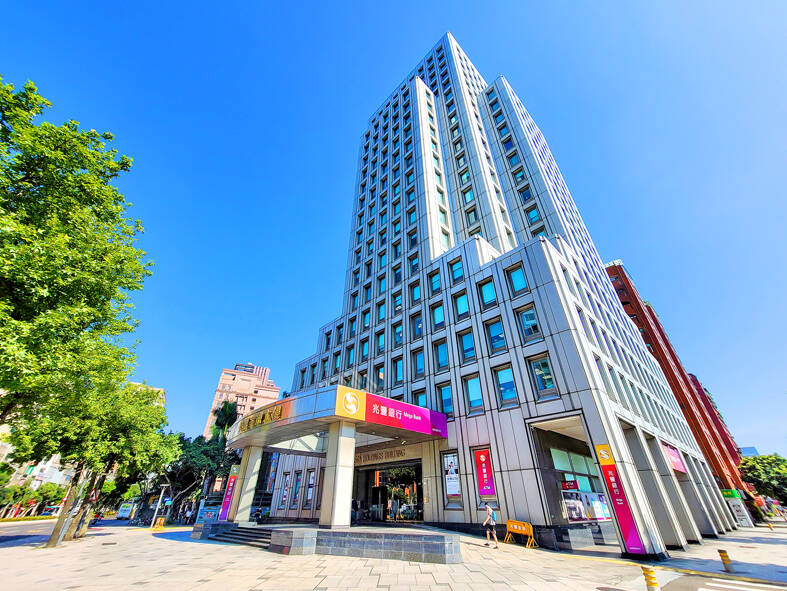State-run Mega Financial Holding Co (兆豐金控) yesterday said it expects profit momentum to stay healthy this quarter after net income in the first three quarters surged almost twofold year-on-year, thanks to strong wealth management and trading operations.
Mega Financial president Hsiao Yu-mei (蕭玉美) gave the positive guidance during an online investors’ conference.
“Mega Financial saw its net income soar 98 percent to a record high of NT$27.03 billion [US$865 million] in the first three months, or earnings of NT$1.92 per share, making it the most profitable among state-run peers,” Hsiao said.

Photo courtesy of Mega Financial Holding Co
Hsiao attributed the showings to stable core banking businesses as well as advances in wealth management and trading operations.
Cross-selling and other income enhancing strategies also bore fruit, she said.
Profit momentum would be sustainable this quarter and beyond, with interest rates hovering at similar levels at home and abroad, allowing its banking subsidiary, Mega International Bank (兆豐銀行), to take further advantage of interest rate differences between Taiwan and the US to rake in currency swap income, Hsiao said.
Currency swap profit amounted to NT$11.33 billion in the first nine months, helping lift overall trading gains by 2.8 times. Mega Bank reported a 55 percent increase in net income.
Wealth management expanded 22 percent, lending support to a 7 percent increase in fee income, the company said in a statement, adding that the world gradually emerged from a bear market seen last year.
As a result, Mega Securities Co’s (兆豐證券) net income expanded almost threefold while profit at the venture capital unit exploded 37.14 times, it said.
However, the non-life insurance wing Chung Kuo Insurance Co (兆豐產險) remained a drag, incurring a net loss of NT$1.55 billion linked to ill-fated COVID-19 policies, it said.
The figure represented a sharp easing from NT$5.6 billion losses a year earlier.

PROTECTION: The investigation, which takes aim at exporters such as Canada, Germany and Brazil, came days after Trump unveiled tariff hikes on steel and aluminum products US President Donald Trump on Saturday ordered a probe into potential tariffs on lumber imports — a move threatening to stoke trade tensions — while also pushing for a domestic supply boost. Trump signed an executive order instructing US Secretary of Commerce Howard Lutnick to begin an investigation “to determine the effects on the national security of imports of timber, lumber and their derivative products.” The study might result in new tariffs being imposed, which would pile on top of existing levies. The investigation takes aim at exporters like Canada, Germany and Brazil, with White House officials earlier accusing these economies of

Taiwan Semiconductor Manufacturing Co (TSMC, 台積電) would not produce its most advanced technologies in the US next year, Minister of Economic Affairs J.W. Kuo (郭智輝) said yesterday. Kuo made the comment during an appearance at the legislature, hours after the chipmaker announced that it would invest an additional US$100 billion to expand its manufacturing operations in the US. Asked by Taiwan People’s Party Legislator-at-large Chang Chi-kai (張啟楷) if TSMC would allow its most advanced technologies, the yet-to-be-released 2-nanometer and 1.6-nanometer processes, to go to the US in the near term, Kuo denied it. TSMC recently opened its first US factory, which produces 4-nanometer

Teleperformance SE, the largest call-center operator in the world, is rolling out an artificial intelligence (AI) system that softens English-speaking Indian workers’ accents in real time in a move the company claims would make them more understandable. The technology, called accent translation, coupled with background noise cancelation, is being deployed in call centers in India, where workers provide customer support to some of Teleperformance’s international clients. The company provides outsourced customer support and content moderation to global companies including Apple Inc, ByteDance Ltd’s (字節跳動) TikTok and Samsung Electronics Co Ltd. “When you have an Indian agent on the line, sometimes it’s hard

‘SACRED MOUNTAIN’: The chipmaker can form joint ventures abroad, except in China, but like other firms, it needs government approval for large investments Taiwan Semiconductor Manufacturing Co (TSMC, 台積電) needs government permission for any overseas joint ventures (JVs), but there are no restrictions on making the most advanced chips overseas other than for China, Minister of Economic Affairs J.W. Kuo (郭智輝) said yesterday. US media have said that TSMC, the world’s largest contract chipmaker and a major supplier to companies such as Apple Inc and Nvidia Corp, has been in talks for a stake in Intel Corp. Neither company has confirmed the talks, but US President Donald Trump has accused Taiwan of taking away the US’ semiconductor business and said he wants the industry back